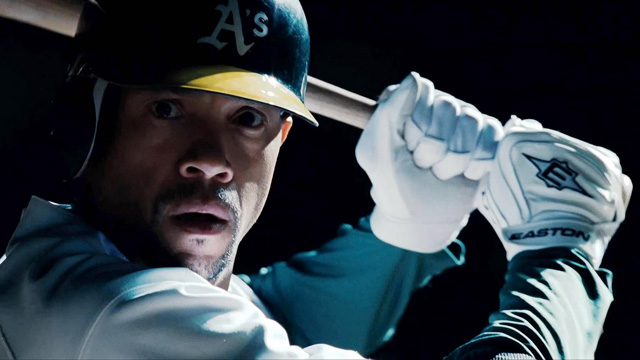REVIEW: "Moneyball"
Normally, I don’t talk about sports movies here on the site. I’ve never been what you’d call a sports fan. Nevertheless, I went to see Bennett Miller’s new film Moneyball yesterday, purely on the merit of its cast and story. The latter is that of Oakland Athletics general manager Billy Beane, and his 2002 attempt to build a baseball team on a budget, entirely based on statistics.
Moneyball introduces us to Billy Beane after Oakland’s disappointing loss to the New York Yankees in a pivotal post-season game. The A’s soon lose three of their key players, and Beane is left trying to pick up the pieces of the club with a budget dwarfed by those of the other Major League teams. Beane struggles with the rest of the team’s management to build a competitive team with comparatively little money.
During a visit to the Cleveland Indians’ war room, Beane runs into a promising analyst named Peter Brand, who graduated from Yale with a degree in economics. Brand (Jonah Hill) believes in a controversial theory of team management based on statistics, specifically On Base Percentage. After hiring Brand, Beane aims to reinvent the National Pastime, despite strong opposition from his scouts, assistant manager and team fans.
Pitt’s first appearance as Beane immediately grabs your attention. He is a man with a number of curious habits, including a fear of stepping into the stadium during a game and a compulsion to continuously turn a game’s play-by-play on and off.
We gradually learn about Beane’s backstory as a stellar young prospect in the 1970s, and how he was picked up out of high school by the New York Mets. Fortunately, we’re not given this information all at once; rather, it trickles out in short flashbacks as they relate back to the main story.
Pitt is an actor who, despite his oft-gossiped-about star status, can disappear into a role. He reminds me of an older, more experienced version of Ryan Gosling (without the commitment to Method acting). As Beane, Pitt doesn’t give the character away too quickly. We learn about Beane at the same speed as if we were working with him in the Oakland A’s office. The movie, in the end, is more about Beane as a person than the tactics he employs as Oakland’s general manager.
Jonah Hill, meanwhile, is another standout performer. Hill’s dramatic roles (like his recent turn in Cyrus, opposite John C. Reilly) are a welcome companion to his raunchier comedic work. Hill and Pitt bounce off each other seamlessly as their characters work on “card-counting” in the game of baseball.
My only problem with Hill’s character was the lack of information about his background. Peter Brand is apparently a synthesis of several real-life people, but it would be nice to know a bit more about him even in a movie that focuses primarily on Billy Beane.
The photography in Moneyball comes courtesy of Wally Pfister, who has distinguished himself shooting Christopher Nolan’s movies, including Memento, Insomnia, Batman Begins, The Prestige, The Dark Knight, and Inception. While Pfister’s touch in Moneyball is less stylistic than his recent work, he efficiently tells the story of Beane and the 2002 Oakland A’s, placing the camera in a way that makes us feel like we have front-row seats to the real game: behind the scenes of the Major League.
Pitt’s scenes with his onscreen daughter Casey (Kerris Dorsey) were a pleasant surprise. Like Hill, Dorsey has great chemistry with Pitt, and it doesn’t hurt that she has a couple of nice moments singing a cover of Lenka’s 2008 song “The Show”. Beane’s relationship with his daughter could have been frittered away or ignored, but the fact that it’s reasonably well-developed gives Pitt’s portrayal an extra layer.
From an editing perspective, I liked the use of blown-up TV footage at several points in Moneyball. It enforces the idea that most of America saw the original sports coverage through TV, back before online streaming video and timeshifting was as prevalent as it is today. The important moments preserved in this standard-definition footage will resonate with Oakland fans for a long time, and it makes sense that they are incorporated into the film.
The film also uses snippets of sports-themed talk radio, which plays over top of scenes of Beane struggling with his new statistics-based strategy. Beane is ultimately accountable to the Oakland fans, who take to the airwaves to protest radical decisions within their favourite team. The radio acts as Beane’s impassive antagonist, constantly spitting news and opinions that Beane would prefer not to hear, but that determine the fate of Beane’s career.
Bennett Miller allocates a significant portion of the film to the individual players Beane hires based on the statistics gathered by Brand. We meet Scott Hatteburg (Chris Pratt), an formerly injured catcher trying to rebound as a first baseman, and David Justice (Stephen Bishop), an aging player hoping to end his career honourably. Miller ably manages these secondary characters, exploring some of their quirks and helping even the most sports-oblivious viewer understand the team dynamics.
Not every subtlety of baseball, however, can be conveyed in a single film. If you’re a baseball fan and know the events depicted in Moneyball, you will be better off than the average viewer. The more you know the sport, the more in-jokes you get and the easier it is to concentrate on elements like accuracy.
That’s why I’m taking a few points off my score for Moneyball, just because I couldn’t grasp every element of the movie without some casual research. Considering everything else the film brings to the plate, including an Oscar-worthy performance from Brad Pitt and solid direction, Moneyball gets three stars out of four.
If you’d like a second opinion on this movie, I’m doing a collaboration with friend and fellow blogger Jason Chen. He maintains a comprehensive sports blog at ArmchairHockey.net. Jason has also written a review of Moneyball, one that examines the sports content in the film. Check it out, and tell him I sent you!
What did you think of Moneyball? Were you impressed by Brad Pitt’s work? If you’re a fan of baseball, how accurate was the film? If you hate sports, did you still enjoy the movie? Post your thoughts in the comments section below, or check out my recent reviews:
Recent 2011 Releases:
Eco-Pirate: The Story of Paul Watson | Rise of the Planet of the Apes
Reviews of Classic Movies:
The Graduate (1967) | Rope (1948) | 2001: A Space Odyssey (1968)




